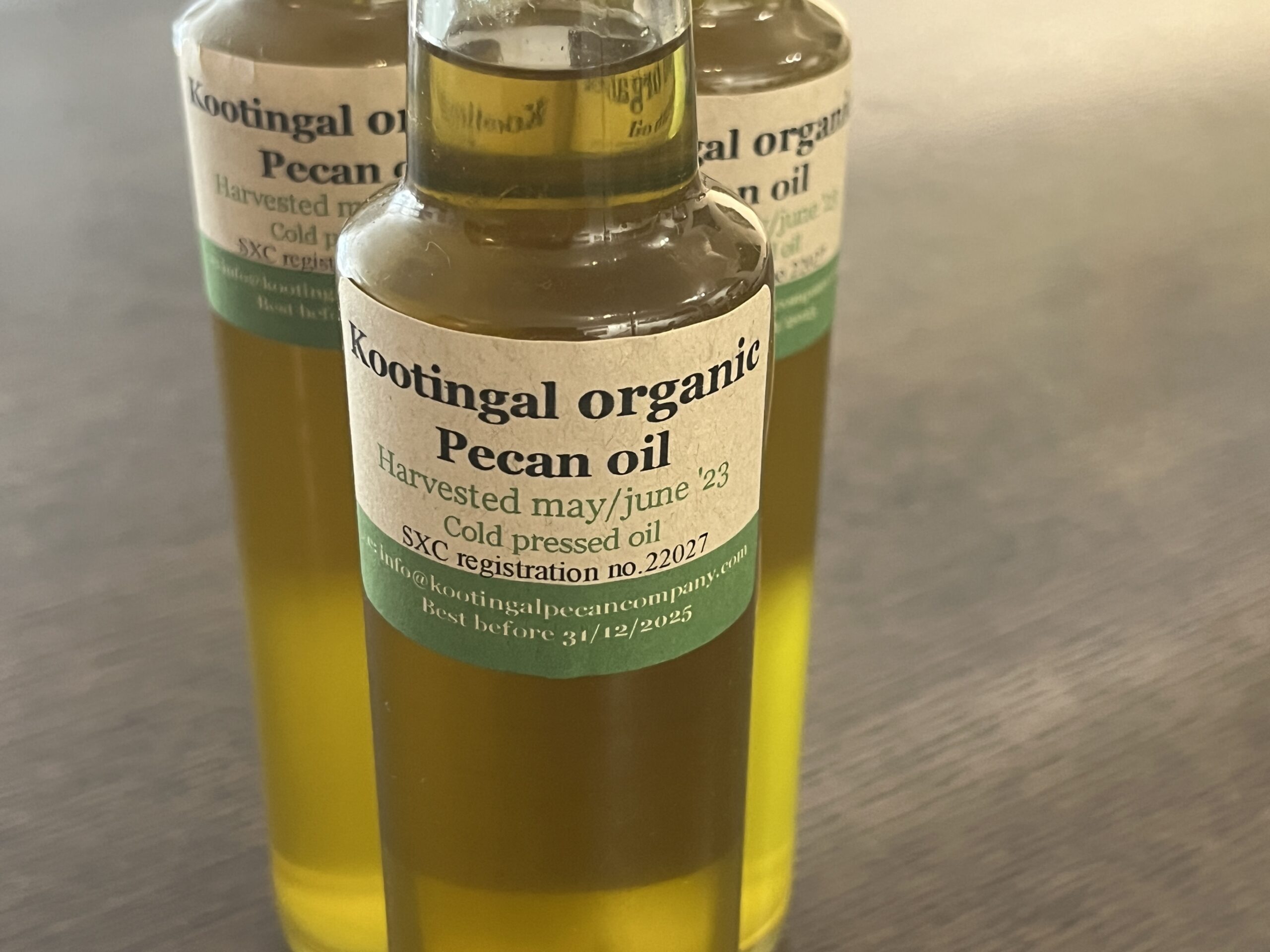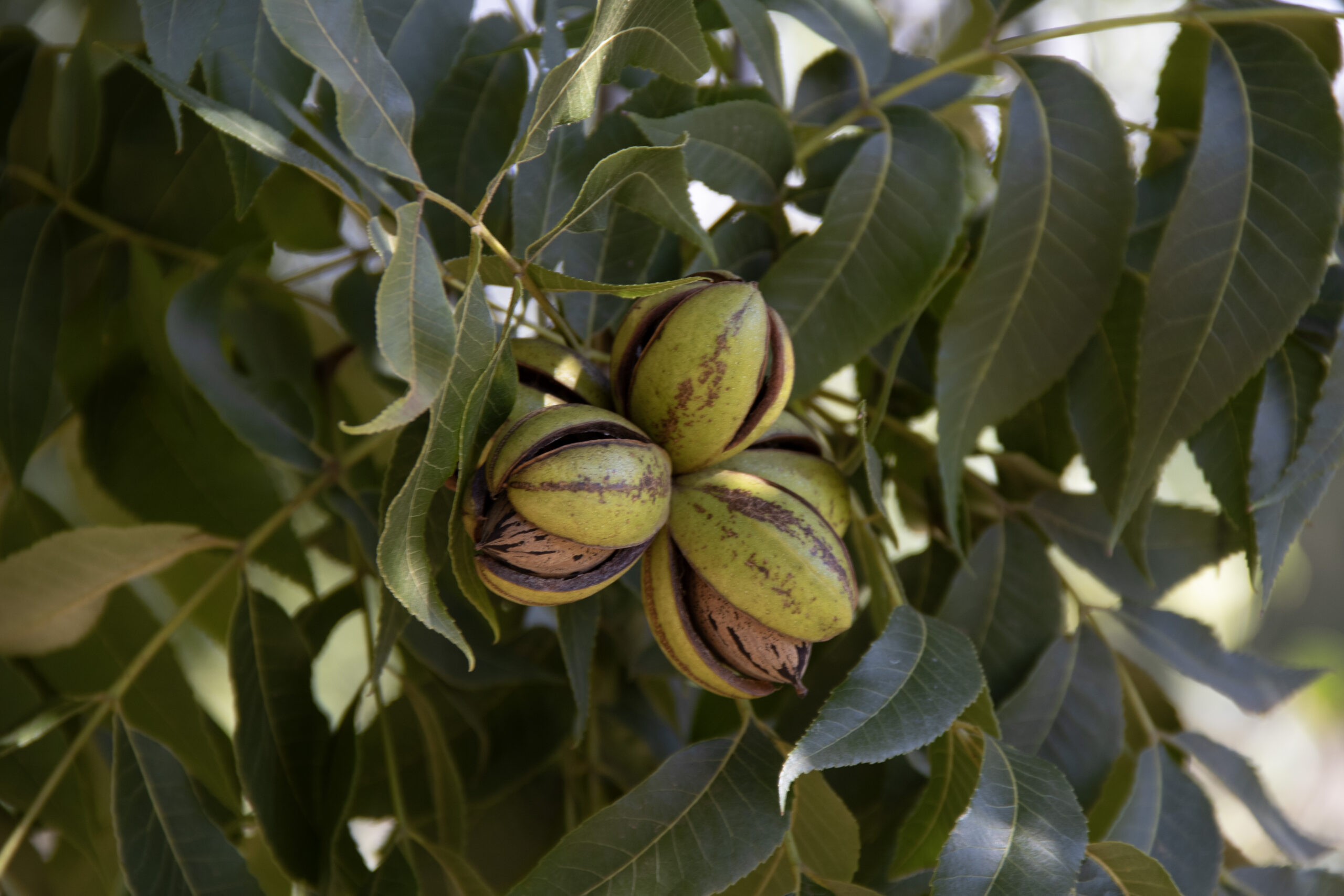A farming system adopted in January 2024 by the Kootingal Pecan Company on its agricultural land, certification and compliance with regenerative agriculture practices is managed by Southern Cross Certified. This organisation also audits us for compliance in organic farming. The decision to seek out and adopt regenerative agricultural practices in the production of organic pecans was the weakness in “just being organic” and the rise of greenwashing. Since transition to organic certification in 2021 this family run farm has sought a holistic approach to regenerative practice that facilitates soil biodiversity through soil fertility and a healthy soil rich in bacteria and fungi. The pecans we take time to grow and process on farm before offering to a select group of chefs, distributors and retailers are through sustainable agriculture and organic practice are identified as being regenerative organic certified. This gives all consumers and customers comfort and knowledge the food system at Kootingal recognises the threat of climate change, industrial agriculture and the impact on soil biology and is addressing these threats by actively committing to sustainable farming led by a healthy soil, with zero or minimal soil disturbance, soil carbon sequestration rich biodiversity rich in organic matter to produce the an excellent quality certified organic pecan.
What does it mean for an Australian pecan to identified as Regenerative organic certified?
It identifies that this farmer and the family are committed to regenerative agriculture practices, beyond industrial agriculture and organic agriculture. The Pecan orchard and farm land focusses on a sustained commitment ton building soil and soil biota; builds soil carbon levels within the soils ecosystem and builds nutrition in food grown in that soil.
The key aims of a Certified Regenerative organic pecan producer are:
The enhancement of soil health and the soils biological cycles .
Maintaining or improving the fertility and biological function of soils.
The production of food of high nutritional value.
Working as far as practicable within a closed system by minimizing the use of non‐ renewable resources.
The avoidance of pollution resulting from agricultural practices and processing.
Kootingal Pecan Company focuses on measurements of four core components of regenerative agriculture. Our measurement and evaluation of these core components ensure that we are aligned with regenerative, organic and social ideals:
1. Soil Organic Carbon
2. Soil Health and Microbial Activity
3. Biodiversity of Root and Plant Eco-system Functions
The core components all work together on the farm and within the pecan orchard. As one component of regenerative agricultural practices responds, other components will also respond. Annual external auditing of these components provides us, the farmer, with accurate information on the status our farm and pecan nut production in relation to sustainable agriculture and being Regenerative organic certified.
These components identify key ecosystem functions and will enable the certified operator and the Certification Body to understand how the land with an emphasis on soil biodiversity and the crop is evolving through holistic management.
Soil organic carbon
This is a measurable component of soil organic matter that we at Kootingal pecan company manage and track. Organic matter contributes to nutrient retention and turnover, soil structure, moisture retention and availability and carbon sequestration. Sufficient organic material should be regenerated and/or returned to the soil to improve, or at least maintain, humus levels. Conservation and recycling of nutrients is a major feature of any regenerative farming system. A high or routine use of off‐farm inputs is not encouraged by this Standard. As a general principle, soil is managed to increase biological activity and diversity. Any practice that kills or depletes soil biota and biological diversity is discouraged. Soil carbon levels are used as one of the outcome measurements for soil health. Soils have declined in soil organic carbon (SOC) levels, however, there are many regenerative practices that can rebuild carbon levels including diversity in plants and in soil biota. This is a core activity and primary principle of regenerative farming.
Ensuring sustainable soil health.
Soil organic Carbon is a measurable component of soil organic matter. Organic matter contributes to nutrient retention and turnover, soil structure, moisture retention and availability and carbon sequestration. We are striving through good farming practice to ensure more than sufficient organic material is regenerated and/or returned to the soil to improve, or at least maintain, humus levels. Conservation and recycling of nutrients is a major feature of any regenerative farming system. Kootingal Pecan company does this each year by;
- through the mulching of the cover crop.
- Chipping in situ all the prunings from the trees
- returning the cracked pecan shells and waste pecan to the orchard floor.
As regenerative farmers we seek not to excessively apply off‐farm inputs that are products of industrial agriculture such as trace elements. As a general principle, all the soil within the farm and the pecan orchard is managed to increase biological activity and diversity. Our regenerative farming practices focus on building soil biota and biological diversity throughout the year. Soil carbon levels are used as one of the outcome measurements for soil health. Our soils through previous historic stewardship have declined in soil organic carbon (SOC) levels, however, since 2021 and our agricultural practice to adopt regenerative practices that rebuild carbon levels are showing results reflected in diversity in plants and in soil biota across the cover crop for example. This is a core activity for Kootingal Pecan and others seeking to be pursue sustainable agriculture understand that this is a primary principle of regenerative farming.
Soil Health & Microbial Activity
Soil health is finally recognised as one of the foundations of agriculture through the work of Nicole Masters and others. A focus on diversity, above and below the soil profile has at its core the goal to improve soil health through increased microbial, fungal and bacterial activity. Kootingal Pecan Company in its food system recognises this as a central requirement of regenerative production. Healthy soil is the prerequisite for healthy plants, animals and products. The care of a living, microbially active soil and the maintenance or improvement of the soil structure. Protecting the soil from industrial agriculture and or the threat of soil erosion with a rich soil biodiversity, high soil fertility will yield a healthy soil.
As a farmer we also without hesitation recognise and have adopted methods to raise Microbial biomass through regenerative practices that increase inputs of organic carbon to the soil and improve the organic chemical and physical conditions experienced by microorganisms in soil. We know that Microbial biomass is an important indicator of soil health because it is closely related to nutrient release from plant residues.
Plant nutrient density is an indicator of the combined effect of soil health, plant management, and nutrients used. Plant nutrient density can be measured and is a strong indicator of a regenerative system. Our management plan as a regenerative farmer relies upon biological diversity, crop rotations, with refinement of the the cover crop to reflect the need of soil to improve microbial activity. Cultural control, that is no hooves in the orchard. We seek to only drive around the perimeter of the orchard to minimise compaction, then the minimal application of approved mineral-bearing rocks and aspects of biological pest management to maintain soil productivity and tilth, are encouraged to supply plant nutrients and to control insects, diseases, weeds and other pests.
Biodiversity Soil and Eco-system
Biodiversity must be taken into account when considering regenerative agriculture. Enabling and supporting the biodiversity on the farm is the third strand to our regenerative agricultural practices . This includes the introduction and annual management of cover crops, new infrastructure to deliver productivity gains, working alongside neighbouring properties in awareness of objectives.
At Kootingal Pecan Company, we only offer our organic pecans in a range of products and pack sizes for your enjoyment. You can see this range of products and purchase these from our shop
Our commitment to you our customer and consumer is to share our performance as a regenerative farmer so that we all informed about the product you choose to buy and enjoy.
supporting existing infrastructure, changes in management and cropping systems and working
alongside neighbouring properties and or national parks and nature reserves.
Organic Standard principles for biodiversity are:
- Monitoring and measuring of microbial biomass
- Use of cropping or natural fertilisers that promote and enhance eco-system functions
- establishing and/or retaining vegetation on farms,
- managing rangelands, waterways, floodplains, rivers, streams and wetlands,
- provision of wind breaks and non‐cultivated buffer zone areas.


